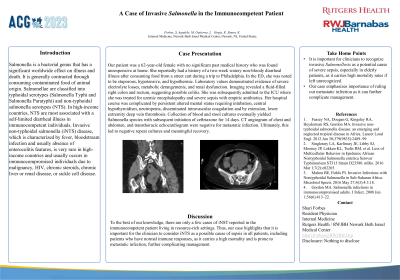Tuesday Poster Session
Category: Small Intestine
P4181 - A Case of Invasive Salmonella in the Immunocompetent Patient
Tuesday, October 24, 2023
10:30 AM - 4:00 PM PT
Location: Exhibit Hall

Has Audio
- SF
Shari D. Forbes, MD
Newark Beth Israel Medical Center
Newark, NJ
Presenting Author(s)
Shari D. Forbes, MD, Miguel Agudelo, MD, Leandro Gutierrez, MD, Kyrillos Girgis, MD, Kawana Simon, MD
Newark Beth Israel Medical Center, Newark, NJ
Introduction: Salmonella is a bacterial genus that has a significant worldwide effect on illness and death. It is generally contracted through consuming contaminated food of animal origin. Salmonellae are classified into typhoidal serotypes (Salmonella Typhi and Salmonella Paratyphi) and non-typhoidal salmonella serotypes (NTS). In high-income countries, NTS are most associated with a self-limited diarrheal illness in immunocompetent individuals. Invasive non-typhoidal salmonella (iNTS) disease, which is characterized by fever, bloodstream infection and usually absence of enterocolitis features, is very rare in high-income countries and usually occurs in immunocompromised individuals due to malignancy, HIV, chronic steroids, chronic liver or renal disease, or sickle cell disease.
Case Description/Methods: Our patient was a 62-year-old female with no significant past medical history who was found unresponsive at home. She reportedly had a history of a two-week watery non-bloody diarrheal illness after consuming food from a street cart during a trip to Philadelphia. In the ED, she was noted to be stuporous, hypotensive, and hypothermic. Laboratory values demonstrated evidence of severe electrolyte losses, metabolic derangements, and renal dysfunction. Imaging revealed a fluid-filled right colon and rectum, suggesting possible colitis. She was subsequently admitted to the ICU where she was treated for uremic encephalopathy and severe sepsis with empiric antibiotics. Her hospital course was complicated by persistent altered mental status requiring intubation, central hypothyroidism, neutropenia, disseminated intravascular coagulation and by extension, lower extremity deep vein thrombosis. Collection of blood and stool cultures eventually yielded Salmonella species with subsequent initiation of ceftriaxone for 14 days. Ultimately, this led to negative repeat cultures and meaningful recovery.
Discussion: To the best of our knowledge, there are only a few cases of iNST reported in the immunocompetent patient living in resource-rich settings. Thus, our case highlights that it is important for the clinician to consider iNTS as a possible cause of sepsis in all patients, including patients who have normal immune responses, as it carries a high mortality and is prone to metastatic infection, further complicating management.
Disclosures:
Shari D. Forbes, MD, Miguel Agudelo, MD, Leandro Gutierrez, MD, Kyrillos Girgis, MD, Kawana Simon, MD. P4181 - A Case of Invasive Salmonella in the Immunocompetent Patient, ACG 2023 Annual Scientific Meeting Abstracts. Vancouver, BC, Canada: American College of Gastroenterology.
Newark Beth Israel Medical Center, Newark, NJ
Introduction: Salmonella is a bacterial genus that has a significant worldwide effect on illness and death. It is generally contracted through consuming contaminated food of animal origin. Salmonellae are classified into typhoidal serotypes (Salmonella Typhi and Salmonella Paratyphi) and non-typhoidal salmonella serotypes (NTS). In high-income countries, NTS are most associated with a self-limited diarrheal illness in immunocompetent individuals. Invasive non-typhoidal salmonella (iNTS) disease, which is characterized by fever, bloodstream infection and usually absence of enterocolitis features, is very rare in high-income countries and usually occurs in immunocompromised individuals due to malignancy, HIV, chronic steroids, chronic liver or renal disease, or sickle cell disease.
Case Description/Methods: Our patient was a 62-year-old female with no significant past medical history who was found unresponsive at home. She reportedly had a history of a two-week watery non-bloody diarrheal illness after consuming food from a street cart during a trip to Philadelphia. In the ED, she was noted to be stuporous, hypotensive, and hypothermic. Laboratory values demonstrated evidence of severe electrolyte losses, metabolic derangements, and renal dysfunction. Imaging revealed a fluid-filled right colon and rectum, suggesting possible colitis. She was subsequently admitted to the ICU where she was treated for uremic encephalopathy and severe sepsis with empiric antibiotics. Her hospital course was complicated by persistent altered mental status requiring intubation, central hypothyroidism, neutropenia, disseminated intravascular coagulation and by extension, lower extremity deep vein thrombosis. Collection of blood and stool cultures eventually yielded Salmonella species with subsequent initiation of ceftriaxone for 14 days. Ultimately, this led to negative repeat cultures and meaningful recovery.
Discussion: To the best of our knowledge, there are only a few cases of iNST reported in the immunocompetent patient living in resource-rich settings. Thus, our case highlights that it is important for the clinician to consider iNTS as a possible cause of sepsis in all patients, including patients who have normal immune responses, as it carries a high mortality and is prone to metastatic infection, further complicating management.
Disclosures:
Shari Forbes indicated no relevant financial relationships.
Miguel Agudelo indicated no relevant financial relationships.
Leandro Gutierrez indicated no relevant financial relationships.
Kyrillos Girgis indicated no relevant financial relationships.
Kawana Simon indicated no relevant financial relationships.
Shari D. Forbes, MD, Miguel Agudelo, MD, Leandro Gutierrez, MD, Kyrillos Girgis, MD, Kawana Simon, MD. P4181 - A Case of Invasive Salmonella in the Immunocompetent Patient, ACG 2023 Annual Scientific Meeting Abstracts. Vancouver, BC, Canada: American College of Gastroenterology.
